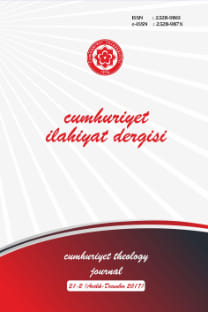Cassirer'e Göre Efsane ve Dini Kültürde İnsanm Yeri
Günümüz kültürü içinde antropolojik yaklaşımların çok çeşitliliği ve renkliği içinde 'insan' hakkında ortaya konulan düşünceler ne yazık ki, birbirleriyle irtibatsız ve kopuk biçimdedir. Bu durumu haklı olarak bir sorun olarak gören Cassirer, biriyle. uyumlu bir insan yaklaşımının, insanlığın ortak kültür ürünleri olan bilim, sanat, felsefe ve din bilimleri arasında oluşturulacak çabalar sonucunda ortaya konulabileceği görü- şünedir. Bu makale Cassirer'in efsane ve dinde insanın nasıl görüldü- ğüne ilişkin düşüncelerinin felsefe tarihçisi yaklaşımıyla irdelenmesidir. Ona göre, insanın belirgin karakteri, onun ayırıcı işareti, metafizik ve fizik doğası değil, onun işlevidir. Bu çaba, insanlık dairesini tanımlayan ve belirleyen insan faaliyetlerinin bir sistemidir. Dil, efsane, din, sanat, bilim ve tarih bu dairenin öğelerini oluşturur. Bu yüzden bir 'insan felsefesi', bize bu insani faaliyetlerin her birinin temel yapısını kavrama ve aynı zamanda onları organik bir bütün olarak anlama imkanı verir
Anahtar Kelimeler:
Cassirer, işlevsel, sembolik şekiller, saçma, dindarca bir hasret
Cassirer'e Göre Efsane ve Dini Kültürde İnsanm Yeri
Today unfortunately it seems that within the .. :various anthropological approaches the ideas about the nature of man tend to be incoherent and disconnected from each other. Raising criticisms regarding to this incongruity Cassirer argues that a coherent and consistent understanding of the nature of man is possible through the joint work of science, art, philosophy, and religious studies. Tl:ıis study surveys, by the perspective of a histerian of philosophy, the ideas put forward by Cassirer about how man has been seen so far in the mythology and religion. To him, the dominant and distinc::t feature of man is not his/her metaphysical and, physical nature but his functionality. This effort is a system of human activity which defınes and determines the circle of humanity. Language, mythology, religion, art, science and history are the constituent elements of this cycle. Therefore, a 'human philosophy' enables us to conceive the basic structure of these human activities and to understand them as an organic unity
Keywords:
Cassirer, functionnel, symbolic forms, absurdum, pium desiderum.,
___
- C. ü. İla h iyat
- Fakültesi Dergisi
- XII/1 - 2008, 275-298
- Cassirer'e Göre Efsane ve Dini Kültürde İnsanm Yeri
- Necati DEMiR*
- ISSN: 2528-9861
- Yayın Aralığı: Yılda 2 Sayı
- Başlangıç: 1996
- Yayıncı: Cumhuriyet Üniversitesi İlahiyat Fakültesi
Sayıdaki Diğer Makaleler
Cassirer'e Göre Efsane ve Dini Kültürde İnsanm Yeri
Belçika'da İslamofobi ve Müslümanlara Yönelik Ayrımcılik
İlâhiyat Fakülteleri Tefsir Anabilim Dalı V. Koordinasyon Toplantısı
İsmail ÇALIŞKAN, Yusuf ALEMDAR
İslam Hukukuna Göre Anne Rahminde Sakat Olan Çocukların Kürtaj Yoluyla Düşürülmesinin Hükmü
Müsfir B. Ali B. Muhammed EI-KAHTAN, Abdullah KAHRAMAN, Abdullah KAHRAMAN
Bosnalı Bir Şeyhülislam Mehmed Refik Efendi
Kelamcılarda Bilginin Tanımı Problemi
Açık ve Anlaşılır Bir Kur'an Çevirisinin Temel İlkeleri
Şemseddin Ahmet es-Sivasi'nin Ahlak Anlayışı
